

Magic, Energy Transformation, and How it Relates to Science. Magic has been misunderstood by people since the beginning of time, and especially more recently.
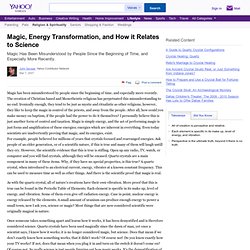
The creation of Christian based and Monotheistic religions has perpetuated this misunderstanding to no end. Ironically enough, they tend to be just as mystic and ritualistic as other religions, however, they like to keep the magic in control of the priests, and away from the people. After all, how could you make money on baptism, if the people had the power to do it themselves? I personally believe this is just another form of control and taxation.
Magic is simply energy, and the act of performing magic is just focus and amplification of these energies; energies which are inherent in everything. For example, people believed for millions of years that crystals focused and rearranged energies. As with the quartz crystal, all of nature's creations have their own vibration. Once someone takes something apart and learns how it works, it has been demystified and is therefore considered science. 12 Spiritual Temperaments. © Copyright 1992, 2000 by Timothy Conway, Ph.D.
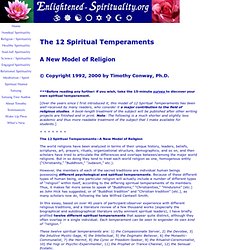
***Before reading any further: if you wish, take the 15-minute survey to discover your own spiritual temperament. [Over the years since I first introduced it, this model of 12 Spiritual Temperaments has been well-received by many readers, who consider it a major contribution to the field of religious studies. A book-length treatment of the subject will be published after other writing projects are finished and in print. Note: The following is a much shorter and slightly less academic and thus more readable treatment of the subject that I make available for students.]
The 12 Spiritual Temperaments--A New Model of Religion. 94. Dr. Jeffrey Long’s Near-Death Experience Research a “Game Changer” for Science. The most comprehensive research into near-death experience deals a kill shot to skeptics and aims to change how science views the afterlife.
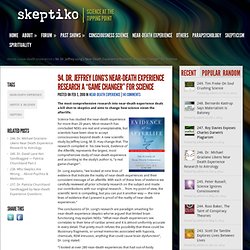
Science has studied the near-death experience for more than 20 years. Most research has concluded NDEs are real and unexplainable, but scientists have been slow to accept consciousness beyond death. A new scientific study by Jeffrey Long, M. D. may change that. Metaphysics. Metaphysics is a traditional branch of philosophy concerned with explaining the fundamental nature of being and the world that encompasses it,[1] although the term is not easily defined.[2] Traditionally, metaphysics attempts to answer two basic questions in the broadest possible terms:[3] Ultimately, what is there?
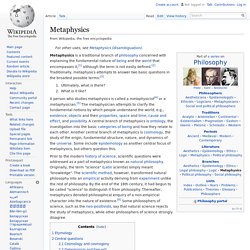
What is it like? Prior to the modern history of science, scientific questions were addressed as a part of metaphysics known as natural philosophy. Originally, the term "science" (Latin scientia) simply meant "knowledge". The scientific method, however, transformed natural philosophy into an empirical activity deriving from experiment unlike the rest of philosophy. Etymology[edit] However, once the name was given, the commentators sought to find intrinsic reasons for its appropriateness. Central questions[edit] Metaphysics 101 - A Meditation Guide - A Handbook. Humanistic psychology. Humanistic psychology is a psychological perspective which rose to prominence in the mid-20th century in response to the limitations of Sigmund Freud's psychoanalytic theory and B.F.

Skinner's behaviorism.[1] With its roots running from Socrates through the Renaissance, this approach emphasizes individuals inherent drive towards self-actualization and creativity. It typically holds that people are inherently good. It adopts a holistic approach to human existence and pays special attention to such phenomena as creativity, free will, and human potential.
It encourages viewing ourselves as a "whole person" greater than the sum of our parts and encourages self exploration rather than the study of behavior in other people. Humanistic psychology acknowledges spiritual aspiration as an integral part of the human psyche. Origins[edit] One of humanistic psychology's early sources was the work of Carl Rogers, who was strongly influenced by Otto Rank, who broke with Freud in the mid-1920s. Existence. First published Wed Oct 10, 2012.
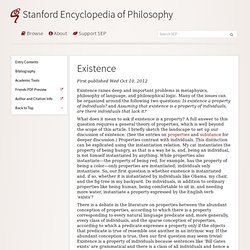
Unwrap your mind — Epistemology. A branch of philosophy concerned with the nature and scope of knowledge Epistemology (; from Greek ἐπιστήμη, epistēmē, meaning 'knowledge', and -logy) is the branch of philosophy concerned with the theory of knowledge.

Epistemology is the study of the nature of knowledge, justification, and the rationality of belief. Much debate in epistemology centers on four areas: (1) the philosophical analysis of the nature of knowledge and how it relates to such concepts as truth, belief, and justification,[1][2] (2) various problems of skepticism, (3) the sources and scope of knowledge and justified belief, and (4) the criteria for knowledge and justification. Epistemology addresses such questions as: "What makes justified beliefs justified? ",[3] "What does it mean to say that we know something? " Etymology[edit] Chaos and Cosmos. People prefer order to chaos and it appears they are willing to pay quite a price for that order.
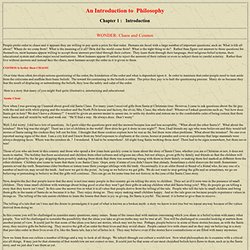
Humans are faced with a large number of important questions, such as: What is life all about? Where do we come from?